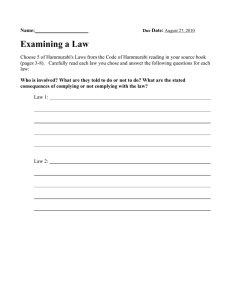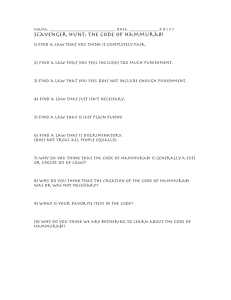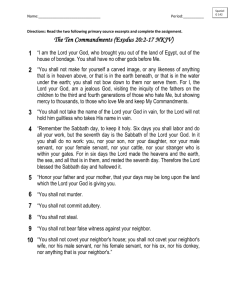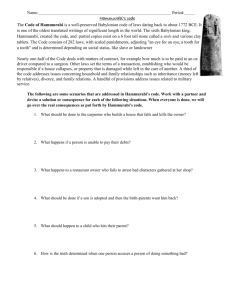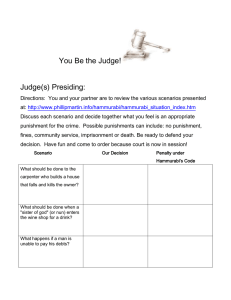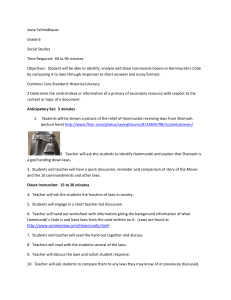The Ten Commandments from The New English Bible
advertisement
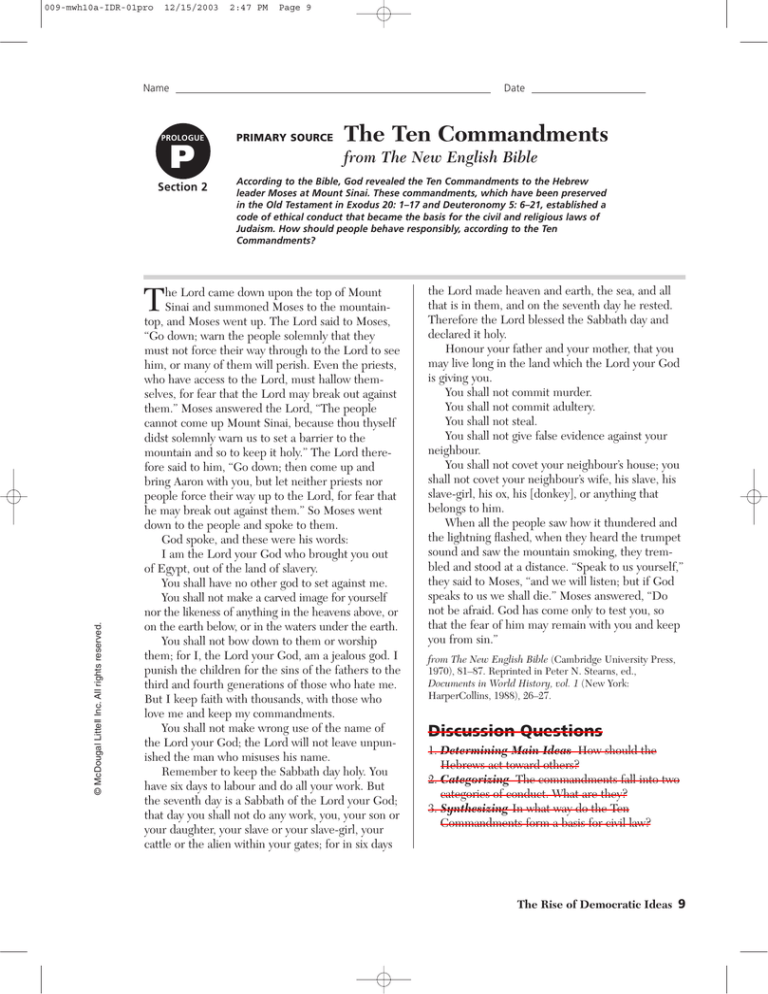
009-mwh10a-IDR-01pro 12/15/2003 2:47 PM Page 9 Name Date PROLOGUE P Section 2 © McDougal Littell Inc. All rights reserved. T PRIMARY SOURCE The Ten Commandments from The New English Bible According to the Bible, God revealed the Ten Commandments to the Hebrew leader Moses at Mount Sinai. These commandments, which have been preserved in the Old Testament in Exodus 20: 1–17 and Deuteronomy 5: 6–21, established a code of ethical conduct that became the basis for the civil and religious laws of Judaism. How should people behave responsibly, according to the Ten Commandments? he Lord came down upon the top of Mount Sinai and summoned Moses to the mountaintop, and Moses went up. The Lord said to Moses, “Go down; warn the people solemnly that they must not force their way through to the Lord to see him, or many of them will perish. Even the priests, who have access to the Lord, must hallow themselves, for fear that the Lord may break out against them.” Moses answered the Lord, “The people cannot come up Mount Sinai, because thou thyself didst solemnly warn us to set a barrier to the mountain and so to keep it holy.” The Lord therefore said to him, “Go down; then come up and bring Aaron with you, but let neither priests nor people force their way up to the Lord, for fear that he may break out against them.” So Moses went down to the people and spoke to them. God spoke, and these were his words: I am the Lord your God who brought you out of Egypt, out of the land of slavery. You shall have no other god to set against me. You shall not make a carved image for yourself nor the likeness of anything in the heavens above, or on the earth below, or in the waters under the earth. You shall not bow down to them or worship them; for I, the Lord your God, am a jealous god. I punish the children for the sins of the fathers to the third and fourth generations of those who hate me. But I keep faith with thousands, with those who love me and keep my commandments. You shall not make wrong use of the name of the Lord your God; the Lord will not leave unpunished the man who misuses his name. Remember to keep the Sabbath day holy. You have six days to labour and do all your work. But the seventh day is a Sabbath of the Lord your God; that day you shall not do any work, you, your son or your daughter, your slave or your slave-girl, your cattle or the alien within your gates; for in six days the Lord made heaven and earth, the sea, and all that is in them, and on the seventh day he rested. Therefore the Lord blessed the Sabbath day and declared it holy. Honour your father and your mother, that you may live long in the land which the Lord your God is giving you. You shall not commit murder. You shall not commit adultery. You shall not steal. You shall not give false evidence against your neighbour. You shall not covet your neighbour’s house; you shall not covet your neighbour’s wife, his slave, his slave-girl, his ox, his [donkey], or anything that belongs to him. When all the people saw how it thundered and the lightning flashed, when they heard the trumpet sound and saw the mountain smoking, they trembled and stood at a distance. “Speak to us yourself,” they said to Moses, “and we will listen; but if God speaks to us we shall die.” Moses answered, “Do not be afraid. God has come only to test you, so that the fear of him may remain with you and keep you from sin.” from The New English Bible (Cambridge University Press, 1970), 81–87. Reprinted in Peter N. Stearns, ed., Documents in World History, vol. 1 (New York: HarperCollins, 1988), 26–27. Discussion Questions 1. Determining Main Ideas How should the Hebrews act toward others? 2. Categorizing The commandments fall into two categories of conduct. What are they? 3. Synthesizing In what way do the Ten Commandments form a basis for civil law? The Rise of Democratic Ideas 9 0030-wh10a-IDR-0102 11/25/2003 4:10 PM Page 30 Name Date 2 Section 1 PRIMARY SOURCE from The Code of Hammurabi More than 3,500 years ago, Hammurabi, king of the Babylonian Empire, ordered scribes to chisel a code of 282 laws onto a tall column of black stone. The column also featured an introduction explaining the intent of the code and a summary of Hammurabi’s kingly deeds. As you read these laws from the code, think about how Mesopotamians defined crimes and how criminals were punished. B efore this portrait let every man who has a legal dispute come forward, read this text, and heed its precious words. The stone tablet will enlighten him in his trouble, and thus may he find justice and breathe easier in his heart, speaking these words: “Hammurabi is a king who cares for his people like a loving father.” 148 If a man take a wife and she become afflicted with disease, and if he set his face to take another, he may. His wife, who is afflicted with disease, he shall not put away. She shall remain in the house which he has built and he shall maintain her as long as she lives. 1 149 If that woman do not elect to remain in her husband’s house, he shall make good to her the dowry which she brought from her father’s house and she may go. If a man bring an accusation against a man, and charge him with a capital crime, but cannot prove it, he, the accuser, shall be put to death. 48 If a man owe a debt and Adad inundate his field and carry away the produce, or, through lack of water, grain have not grown in the field, in that year he shall not make any return of grain to the creditor, he shall alter his contract-tablet and he shall not pay the interest for that entire year. 53 If a man neglect to strengthen his dike and do not strengthen it, and a break be made in his dike and the water carry away the farm-land, the man in whose dike the break has been made shall restore the grain which he has damaged. 54 If he be not able to restore the grain, they shall sell him and his goods, and the farmers whose grain the water has carried away shall share the results of the sale. 113 If a man hold a debt of grain or money against a man, and if he take grain without the consent of the owner from the heap or the granary, they shall call that man to account for taking grain without the consent of the owner from the heap or the granary, and he shall return as much grain as he took, and he shall forfeit all that he has lent, whatever it be. 30 Unit 1, Chapter 2 153 If a woman bring about the death of her husband for the sake of another man, they shall impale her. 195 If a son strike his father, they shall cut off his fingers. 196 If a man destroy the eye of another man, they shall destroy his eye. 197 If one break a man’s bone, they shall break his bone. 200 If a man knock out a tooth of a man of his own rank, they shall knock out his tooth. 216 If he be a freeman, he (the physician) shall receive five shekels. 218 If a physician operate on a man for a severe wound with a bronze lancet [surgical knife] and cause the man’s death; or open an abscess (in the eye) of a man with a bronze lancet and destroy the man’s eye, they shall cut off his fingers. © McDougal Littell Inc. All rights reserved. CHAPTER 0031-wh10a-IDR-0102 11/25/2003 4:17 PM Page 31 Name 225 If he operate on an ox or a donkey for a severe wound and cause its death, he shall give the owner of the ox or donkey one fourth its value. 229 If a builder build a house for a man and do not make its construction firm, and the house which he has built collapse and cause the death of the owner of the house, that builder shall be put to death. 250 If a bull, when passing through the street, gore a man and bring about his death, this case has no penalty. has stretched across my city, I have gathered Sumer and Akkada in my arms, that they might thrive under my protection. I shield them in my peace and protect them in my wisdom. That the strong might not oppress the weak, that the widow and orphan might receive their due, here in Babylon . . . have I inscribed my precious words on a memorial stone and erected my statue as King of Justice. from Robert Francis Harper, The Code of Hammurabi, King of Babylon (Chicago: The University of Chicago Press, 1904). Reprinted in Pierre Schwob, ed., Great Documents of the World: Milestones of Human Thought (Maidenhead, England: McGraw Hill, 1977). Activity Options 1. Developing Historical Perspective With a small group, role-play Mesopotamians who live in the Babylonian Empire. Take turns acting as criminals who break specific laws in Hammurabi’s Code, scribes who record the legal proceedings, and judges who sentence the criminals according to the code. 2. Comparing and Contrasting Invite a local attorney to speak to the class about today’s judicial system. Discuss ways in which laws and penalties for breaking the law in the United States are similar and different to laws and penalties in the Babylonian Empire. © McDougal Littell Inc. All rights reserved. I, Hammurabi, who was a perfect king to the downtrodden people entrusted to me by the god Enlil, I who was, by Marduk’s order, their shepherd, have never tarried, never rested. I gave the people beautiful places, kept all pressing needs far away, and made their lives easier. With the mighty weapons given me by the gods Zababa and Ishtar, with the wisdom granted me by Ea, with the powers I hold from Marduk, I wiped out enemies on every side, put an end to wars, brought prosperity to our land, allowed men to live in peace and let no one fall upon them or harass them. I was called by the great gods, wherefore I became the good shepherd whose staff is straight. My righteous shadow The Code of Hammurabi continued Early River Valley Civilizations 31 Walk Like a Mesopotamian Station 1: Law and Order Instructions 1. Read through each of the Primary Sources: Ten Commandments and Hammurabi Code. 2. Answer the following comparative questions: Question 10 Commandments Determining 1. How should the Hebrews act Main Ideas toward others? Categorizing 2. The commandments fall into two categories of conduct. What are they? Synthesizing 3. In what way do the Ten Commandments form a basis for civil law? Hammurabi Code 1. How should the Bablylonians act toward others? 2. Describe the central theme or code of conduct for the Hammurabi Code. 3. In what way doe the Hammurabi Code form a basis for civil law? 3. Complete a Venn Diagram showing the similarities and differences between the 10 Commandments and Hammurabi Code.
